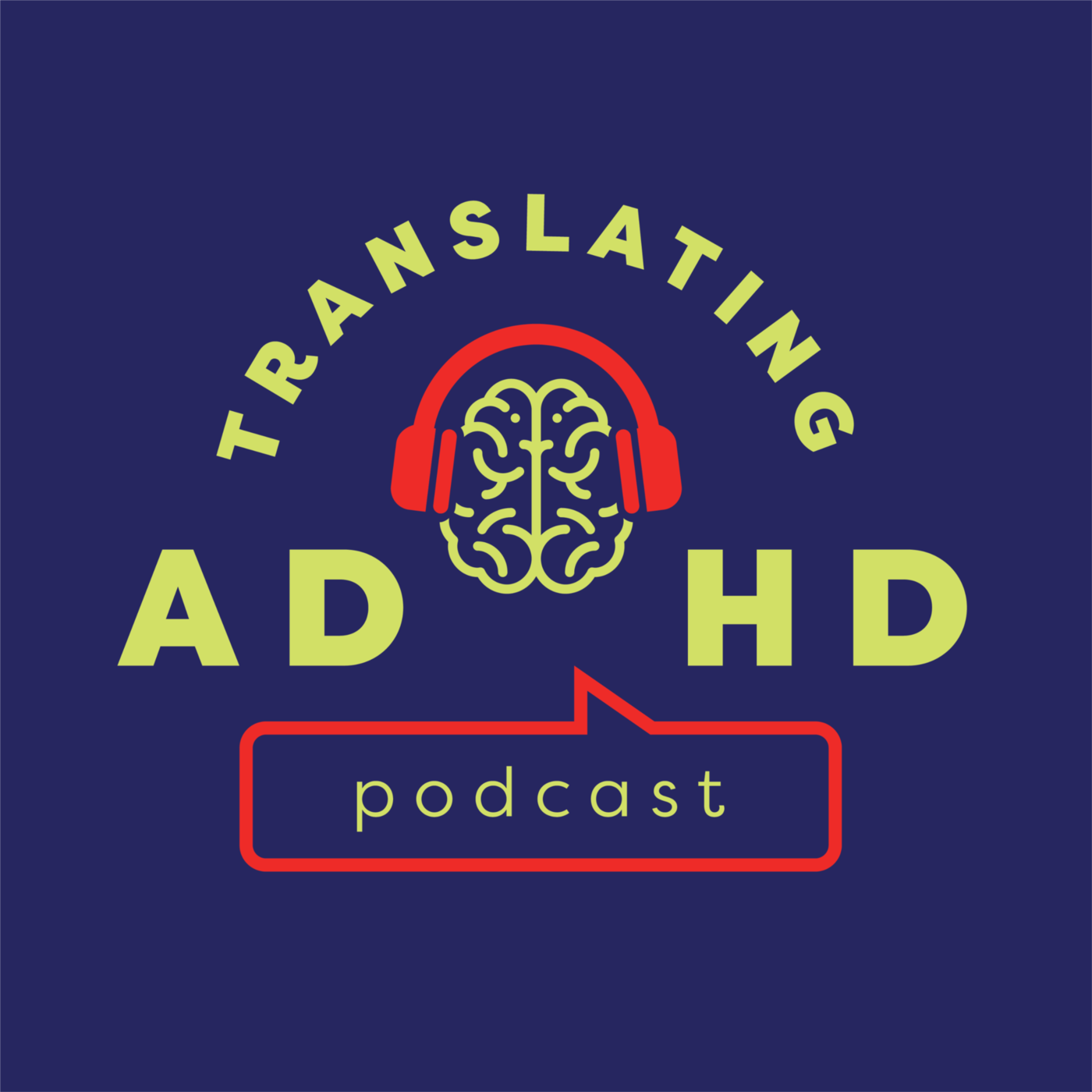
1.4M
Downloads
269
Episodes
We believe that success with ADHD is possible... with a little translation. Hosts Asher Collins and Dusty Chipura, both ADHD coaches who have plenty of insight to share navigating their own ADHD experiences, discuss how to live more authentically as an adult with ADHD and how to create real, sustained change to achieve greater success. If you are an adult with ADHD who wants more out of their business, career, and life, this is the podcast for you!
We believe that success with ADHD is possible... with a little translation. Hosts Asher Collins and Dusty Chipura, both ADHD coaches who have plenty of insight to share navigating their own ADHD experiences, discuss how to live more authentically as an adult with ADHD and how to create real, sustained change to achieve greater success. If you are an adult with ADHD who wants more out of their business, career, and life, this is the podcast for you!
Episodes
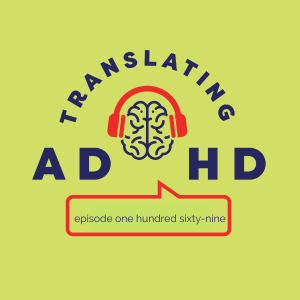
Monday Apr 17, 2023
ADHD and the Understand, Own, Translate Model
Monday Apr 17, 2023
Monday Apr 17, 2023
Ash and Cam often speak of the Understand, Own, Translate model that is so ubiquitous to the mission of the Translating ADHD podcast - that to live fully and to have success one must understand, own and translate their ADHD experience. Today, Ash and Cam explore this model in depth through a single coaching session with one of Ash’s clients. Describing this single session checks many of the boxes the hosts have been speaking of recently like journey thinking, revealing the Meaning Maker, shifting to causation and moving away from ARC.
They also share essential elements of the coaching process and how coach and client shift from dilemma to opportunity through the discovery, action, insight model of coaching. Ash’s client comes with a specific dilemma, and coach and client quickly identify a limiting belief and a realization of the high cost of seeking rewarding behaviors in a particular way, or as the client states with colorful language, the hot, dirty coal way. Coach and client then shift into using rich metaphor work to further understand and own the behavior and start to see openings for opportunity and change.
Episode links + resources:
For more of the Translating ADHD podcast:
- Episode Transcripts: visit TranslatingADHD.com and click on the episode
- Follow us on Twitter: @TranslatingADHD
- Visit the Website: TranslatingADHD.com
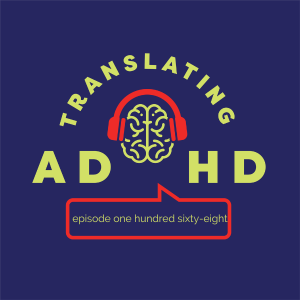
Monday Apr 10, 2023
Short Circuiting the ADHD Meaning Maker
Monday Apr 10, 2023
Monday Apr 10, 2023
Cam takes Ash and listeners on a field trip to the land of ADHD causation, introducing listeners to Cam’s own Meaning Maker (MM). Veteran listeners will recall the challenge for ADHDers to get to causation from the Mt. Rainier Model introduced in episode 10. They will also recall Cam speaking about his Big Idea Generator (BIG). The Meaning Maker is first cousin to the BIG and is a part of everyone’s belief system - the neural system that makes sense of the world and that rationalizes choices and actions. Confirmation bias is a result of selectively picking data to reinforce a position. ADHD can super-charge the MM by plugging into our contextual processor. Informed by urgency and ARC activity, we can infuse our belief systems with “what if!” scenarios that generate doubt and worry. This gives the MM a spotlight on the stage - and an undeniable big signal.
Cam shares his own experience as a teacher more than 20 years ago when his Meaning Maker was very active, reinforcing a story that entrenched him in a perspective of one down. Ash explores this experience with Cam, extracting valuable understanding and perspective. When Cam understood the presence of the MM and what gave it its power, he was able to short circuit the system. The hosts leave listeners with steps to discover and observe their own Meaning Makers.
Episode links + resources:
For more of the Translating ADHD podcast:
- Episode Transcripts: visit TranslatingADHD.com and click on the episode
- Follow us on Twitter: @TranslatingADHD
- Visit the Website: TranslatingADHD.com
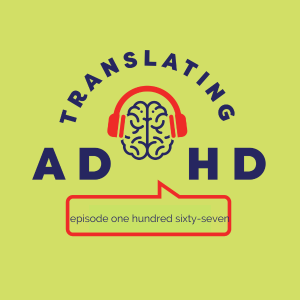
Monday Apr 03, 2023
Locating ADHD Behind the Limiting Story
Monday Apr 03, 2023
Monday Apr 03, 2023
Following up on last week’s episode of emotional autopilot, Ash and Cam explore some of the motivations for this behavior. We do what we need to to get through our days, and emotional autopilot is a coping mechanism for managing strong emotions and the limiting stories that can accompany them.
Cam shares three specific examples of limiting stories and how we can uncover the ADHD that is operating in the background. When we explore causation, we can start to poke holes in our stories that don't serve us. Cam specifically points to 'One Down' or 'I am not enough.' The conflict avoider and the misunderstood rebel. Ash points out distinctions where awareness, agency and choice can completely change the dynamic for the better.
Episode links + resources:
- Episode 10 - Cause, Effect, and the Universal ADHD Question (pt. 1)
- Episode 60 - Revisiting our ADHD Cause and Effect Metaphor: The Valleys
For more of the Translating ADHD podcast:
- Episode Transcripts: visit TranslatingADHD.com and click on the episode
- Follow us on Twitter: @TranslatingADHD
- Visit the Website: TranslatingADHD.com
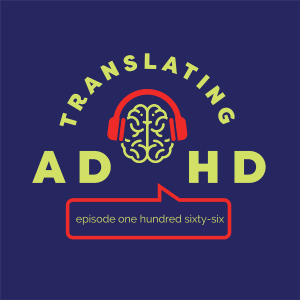
Monday Mar 27, 2023
ADHD and Emotional Autopilot
Monday Mar 27, 2023
Monday Mar 27, 2023
Ash and Cam continue to pull the thread on getting distance from the Adrenaline Response Cycle as they explore common emotional responses when faced with uncertainty and challenge. Today they share the concept of emotional autopilot. We can approach our days and plans in an autopilot fashion expecting our day to go off without a hitch. We can also set our emotions on autopilot or conveniently set them aside - partitioning them from our day. We all know how this plays out. When things don't go according to plan, our emotions come out in anger or disappointment and often at a higher intensity due to emotional dysregulation. Cam and Ash tack against common suggestions regarding emotional regulation, addressing the challenge more at causation than at manifestation.
According to findings in neuroscience, the more aware we are of our emotions the more we can utilize them as a resource. Like Kelly McGonigal’s work on stress, if we shift the way we view emotions, we can turn them into the resources they are. Emotions drive our desires, our attention and our motivation for change. They can also be difficult to manage because they are stronger than positive emotions. Often the big signal is negative in nature and when we do explore emotions, the first thing we hear is our own internal negative self-talk. The hosts share different ways we can resource emotions and ‘crack the lid on the mason jar’ to let emotions inform, and not drive, behavior or responses.
Ash distinguishes emotions and the story associated with the emotions. He also shares an example where a client uses her own body awareness to better understand how her migraines are an indication of surpassing a threshold and entering the crash phase of ARC. Cam shares an example where a client uses time to process emotions in an interaction with a coworker. The hosts emphasize well known podcast concepts like curiosity and pause, disrupt, pivot to shift away from the autopilot mode.
Episode links + resources:
- Emotional Health Ladder Episode 78
- Kelly McGonigal Ted Talk
- Susan David - https://www.susandavid.com/
- Positive Intelligence - https://www.positiveintelligence.com/
For more of the Translating ADHD podcast:
- Episode Transcripts: visit TranslatingADHD.com and click on the episode
- Follow us on Twitter: @TranslatingADHD
- Visit the Website: TranslatingADHD.com
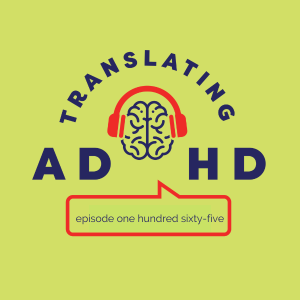
Monday Mar 20, 2023
The In-between Place: Untethered with ADHD
Monday Mar 20, 2023
Monday Mar 20, 2023
To be untethered can mean a lot of things in mental health circles. Often it is referred to as one not being grounded or tethered to reality. With respect to ADHD, it can take on a whole different meaning. Ash and Cam discuss how as coaching clients unravel themselves from the react and respond mode of the Adrenaline Response Cycle, they can find themselves in a rather uncomfortable in-between place straight out of a Dr Seuss book. This is the place of lots of awareness and little change, and a place where many turn back from.
The hosts share how tethers serve to anchor ADHD individuals to strengths, values and purpose. Anchoring to a journey thinking mindset can assist people as they move to their more authentic version of themselves motivated by inspiration and opportunity. Ash shares numerous examples from his Purpose class on how students are developing knowledge without the destination of a clear purpose. Cam shares two specific examples of how this in-between place can feel disorienting for the Big Brainer (freefalling) and the Fast Brainer (infinite acceleration). The hosts share several examples of what listeners can do while they inhabit the in-between place.
Episode links + resources:
For more of the Translating ADHD podcast:
- Episode Transcripts: visit TranslatingADHD.com and click on the episode
- Follow us on Twitter: @TranslatingADHD
- Visit the Website: TranslatingADHD.com
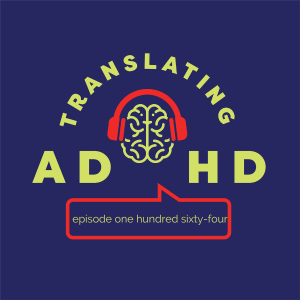
Monday Mar 13, 2023
Monday Mar 13, 2023
This week we are delighted to present another special episode dedicated to exploring the lived experiences of people of color with ADHD by presenting an interview with ADHD advocate and influencer Rach Idowu. When Rach’s own diagnosis was disrupted due to the Covid pandemic, she took it upon herself to educate herself about ADHD. When she didn’t find what she was looking for, she started to share her own experience on social media as a black professional woman living in London.
Rach discusses the challenges she faced as a young girl of immigrant parents trying to succeed without knowing she had ADHD. She talks about how she met resistance in the diagnosis process but used her curiosity and tenacity to keep asking questions and not being satisfied with the status quo. She shares with Cam her passion for advocacy and love of gaming and how gaming serves as a model and metaphor for approaching difficult dilemmas. Finally, Rach shares how her love of helping others and spreading the word about ADHD has fueled her enthusiasm and efforts in a very popular newsletter and her own line of ADHD flashcards.
Episode links + resources:
For more of the Translating ADHD podcast:
- Episode Transcripts: visit TranslatingADHD.com and click on the episode
- Follow us on Twitter: @TranslatingADHD
- Visit the Website: TranslatingADHD.com
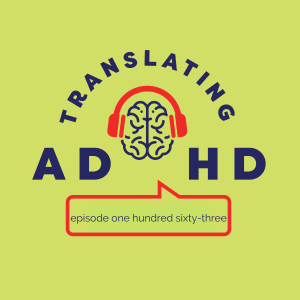
Monday Mar 06, 2023
ADHD and Experimenting with Detaching From Outcome
Monday Mar 06, 2023
Monday Mar 06, 2023
Ash and Cam bring the conversation down to earth from last week’s big picture view on journey thinking and detaching from outcome. Chasing big signal items like drama, shiny objects or avoiding conflict has us beholden to the Adrenaline Response Cycle of delay, hyper-focus, crash, recovery. This is often fueled by destination thinking and attaching to outcomes. Both Ash and Cam bring in examples of where clients design their own practices or experiments to limit ARC-fueled behaviors.
Cam talks about how in coaching we look at behaviors that are not working prior to building new behaviors. He shares an example where a client wants to have less of an emotional experience, specifically FOMO or fear of missing out, while he day-trades stocks. Key to the experience are guidelines or rules of engagement and identifying the learning opportunity. The learning opportunity in this experiment is to bring the Keen Observer to his own emotional experience and see what big signal he is attached to. ADHD executive function challenges make it very difficult to let go or release a thought or belief or some picture of an outcome. The client over a period of experiments was able to generate new awareness and pull the learning forward into how he shows up at work, addressing two of the three barriers of ADHD (See below for link). Ash illustrates how a liability like emotional lability can be turned into a strength like empathy or intuition - that they can be two sides of the same coin. The hosts leave listeners with some places to start looking at building experiments of their own.
Episode links + resources:
For more of the Translating ADHD podcast:
- Episode Transcripts: visit TranslatingADHD.com and click on the episode
- Follow us on Twitter: @TranslatingADHD
- Visit the Website: TranslatingADHD.com
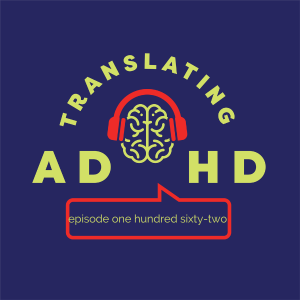
Monday Feb 27, 2023
Monday Feb 27, 2023
Ash and Cam continue to discuss the Adrenaline Response Cycle and ways to create some distance from ARC. The hosts revisit the concept of Journey Thinking - a cornerstone of coaching principles and a common theme on the podcast. Those of us with ADHD are prone to Destination Thinking or a propensity for attaching to specific outcomes.
Both Cam and Ash share their own examples of Journey Thinking and what they did to address it. Ash brings back a popular metaphor of rocks in a foggy pond to illustrate the challenge of next steps and Cam shares how ADHD can exacerbate Destination Thinking.
Part of the attaching to outcome dilemma is that it is often connected to a big signal either positive or negative. Along with that big signal is a limiting story and often intense emotions. The hosts share the practice of catch and release - a way to hold thoughts and feelings less tightly.
Episode links + resources:
- Episode 9 - Embracing Journey Thinking
- More on ARC from Cam’s Blog
- Adrenaline Response Cycle (image below)
For more of the Translating ADHD podcast:
- Episode Transcripts: visit TranslatingADHD.com and click on the episode
- Follow us on Twitter: @TranslatingADHD
- Visit the Website: TranslatingADHD.com
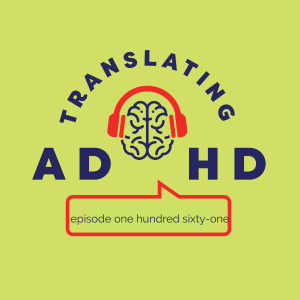
Monday Feb 20, 2023
ADHD and Getting Distance from the Adrenaline Response Cycle
Monday Feb 20, 2023
Monday Feb 20, 2023
Ash and Cam shift from exploring the phases of the Adrenaline Response Cycle to discussing how to become less beholden to the cycle. The hosts share that this work is central to any ADHD coaching relationship - locating motivators other than urgency and hyperfocus to get things done. Ash and Cam focus on three main discussion points in today’s episode.
- Building awareness around how we can rationalize our avoidant behaviors prolonging the Delay phase.
- Building awareness of how we can hunt for meaning in everything we do and everything we don’t do.
- And starting to shift away from our binary (now/not now) approach to time and urgency.
The hosts also look at how awareness of big signals can help to create important new learning about the ARC process. Cam and Ash share numerous examples of how each individual’s approach to this dilemma is unique to that individual and the significance of owning one's own process here. Ash shares a different take on the “Just do it!” approach, and both hosts discuss the importance of popping the ‘fantasy bubble’ and share the limitations of popular phrases like time blindness. Finally, the hosts talk about how they use concepts like emotion, space and social connections to make time more discernible for both Cam and Ash.
Episode links + resources:
- More on ARC from Cam’s Blog
- Adrenaline Response Cycle (image below)
For more of the Translating ADHD podcast:
- Episode Transcripts: visit TranslatingADHD.com and click on the episode
- Follow us on Twitter: @TranslatingADHD
- Visit the Website: TranslatingADHD.com
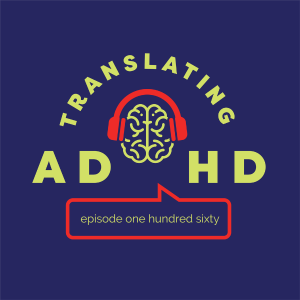
Monday Feb 13, 2023
Monday Feb 13, 2023
Asher and Cam dive deeper into the Adrenaline Response Cycle, exploring the Delay phase that preceeds the Intense Activity phase. Last week they explored the Crash-Recovery phases, so the hosts thought it wise to look at the phase that so many of us with ADHD spend lots of time grappling with. In common circles this is referred to as procrastination, but hosts Cam and Ash prefer to not use this language because it doesn't get to the root of the dilemma. They share several examples of how Delay can play out from doing everything but the urgent task to doing much more than the specific challenge.
Ash reiterates the distinction between constructive and productive work. Cam shares how our contextual wiring can wreak havoc when fueled by fear and urgency, playing out catastrophic scenarios or taking us to valley moments. Both hosts talk about how pause, disrupt and pivot can be useful during the delay phase and the power of acceptance.
Episode links + resources:
- More on ARC from Cam’s Blog
- Adrenaline Response Cycle (image below)
For more of the Translating ADHD podcast:
- Episode Transcripts: visit TranslatingADHD.com and click on the episode
- Follow us on Twitter: @TranslatingADHD
- Visit the Website: TranslatingADHD.com
